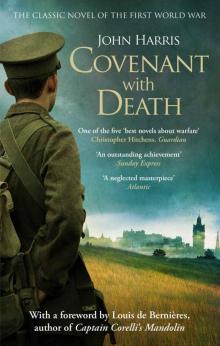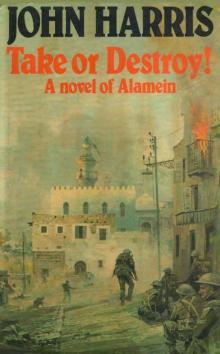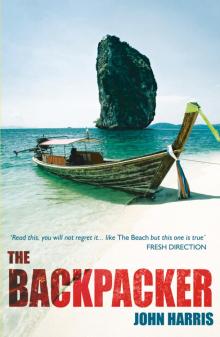- Home
- John Harris
The Cross of Lazzaro Page 4
The Cross of Lazzaro Read online
Page 4
He gestured angrily, with his hand flat along the table, sending the ashtray spinning to the floor. He looked up slowly at Henry sitting stiffly at the other side and smiled apologetically.
‘I forget,’ he said. ‘I feel. Here.’ He thumped his chest. ‘Things I don’t like bite me. Perhaps you never feel bitten?’
Henry shook his head and Caporelli signed for the porter to clear away the mess, and sat still, with a chastened look on his face, as though he felt Henry disapproved of his violence, until all the cigarette ends and matches had disappeared into the dustpan.
As the porter moved away, the door of the telephone booth beyond the bar opened and Maggie Daniells appeared. She came across to where Caporelli was sitting with Henry, her hair still damp from swimming, and Stettner immediately left the counter and stood alongside her, one arm loosely round her waist in a posture that seemed to indicate possession. Henry wondered what there was between them. The skin-diving Stettner was doing for the archaeologists didn’t seem enough to give him this proprietorial air or to explain the warm intimate look the girl flashed at him.
The glance wasn’t lost on Caporelli, and Henry saw his eyes flicker, then the girl was beaming at them, her face radiant.
‘You saw it, I suppose?’ she said, stuffing away notebooks and pencil into the heavy sling-bag she wore on her shoulder. ‘You saw what happened? I’ve never seen anything more dramatic in my life.’
‘A miracle,’ Caporelli said dryly as he signalled for drinks for them all.
‘Professor Dei Monti says we’ll find Arcuneum now for certain,’ she went on. ‘We’ve already sent off to Siebe Gorman and Normalair for more gear. We’ve been looking in the wrong place all these weeks.’
‘I could have told you that when you started,’ Caporelli said quietly.
She glanced at him quickly, then removed her spectacles to have another look, as though she suspected he was being sarcastic. She smiled and managed to look quite beautiful.
‘But if you had, Signor Caporelli,’ she said eagerly, ‘just think how much we’d have missed! We’d have found Arcuneum straight away and then this would never have happened. Lazzaro would never have sent his sign. You know’ – she put her hand on Caporelli’s arm – ‘I’d not have been the slightest bit surprised if Lazzaro himself had pushed the lid of his tomb up and come to give us a hand.’ She laughed, unable to hold back her excitement. ‘The Press have been wonderful. Most considerate about everything.’
‘Of course’ – she leaned across the table – ‘we’ve not seen any of them since it happened. Every telephone in the town’s red-hot by now, I imagine. I had to come all the way up the hill here to get one. I’ve been in touch with Utoio, the professor of archaeology at Milan. He’s Director of the Society for the Protection of Historical Monuments in Trentino and the expert on Lazzaro. He comes from Trepizano himself. He’ll tell us how genuine the cross is, though I haven’t the slightest doubt it is genuine.’
She seemed to notice Henry for the first time. ‘What about you, Dr Chappell,’ she asked. ‘How’re you getting on with your dam?’
‘We’re not,’ Henry said. ‘Everybody’s watching you people and they’ve no time to listen to what we want to do.’
‘What do you want to do?’
‘When I’ve finished I expect we’ll want to drain the dam.’
She stared at him and he noticed for the first time that her eyes were bigger than he’d thought and he wondered again why she always wore those monstrous spectacles.
‘Well,’ she said, ‘that shouldn’t be difficult, should it?’
‘No, but we have to get permission because we have to remove a gate in the stopper wall and that would result in mud being dumped on the beach by the Punta dei Fiori.’
He caught a quick glimpse of Caporelli’s eyes flashing him a warning and realized that she was staring at him with a shocked look on her face.
‘It would do what, Dr Chappell?’ she said, and her voice, which had been warm and friendly before, was suddenly chilly and cautious.
Henry glanced at Caporelli, but it was too late to retract.
‘It would dump a certain amount of mud and silt in the lake by the Punta dei Fiori,’ he said again. ‘And that would interfere with the holiday facilities over there.’
‘But why would draining the dam affect the beach at the Punta dei Fiori? The stream comes down through the town and into the lake by the boat-station.’
Stettner shook his head. ‘No,’ he said with a smile. ‘No, Maggie, it doesn’t. That’s an artificial stream. That was cut by the Von Benedikts. The real stream flowed round the back of La Fortezza and through the Val Caloroso and out by the Punta dei Fiori.’
She stared round at them for a moment in silence. ‘But that would mean that this mud and silt you’re talking about would be deposited over the remains of Arcuneum,’ she said.
‘There wouldn’t be enough to worry about,’ Henry pointed out. ‘It might put another inch or two on top of what’s there already. No more.’
‘But you can’t do that,’ she said angrily. ‘Not now! Not now we’ve established that’s where Arcuneum must be. That’s where the cross came up. That’s where Bishop Lazzaro’s barge must be. That’s where the remains of the city must be situated. You can’t direct silt and mud over that.’
‘We might have to,’ Henry said.
‘Dr Chappell,’ she said stiffly, ‘I know I haven’t your authority, or even your learning, and I probably ought not to talk to you like this, but even you must be aware of what this will mean to us.’
Her manner annoyed him. ‘I’m perfectly aware,’ he said.
‘It’ll mean that after years of searching, after a whole wasted summer diving in the wrong place, you’re proposing to cover up what we’ve uncovered.’
‘An inch or so. No more. It will all have been dispersed by the time it reaches the lake.’
For a moment there was silence, so heavy it was embarrassing. She was staring with flushed cheeks and hot eyes at Henry, who was trying hard and not very successfully to look unconcerned. Caporelli was lighting a long German cigar, his gaze on their faces, a faint flicker of amusement in his eyes, as though he were thoroughly enjoying himself.
Then she drew a deep breath.
‘No,’ she said explosively. ‘I won’t have your mud over Arcuneum, Dr Chappell. It’ll ruin everything we’re doing.’
‘You’ll hardly notice it,’ Henry pointed out.
‘I don’t believe it.’
‘It will darken the water,’ Stettner put in. ‘We’d never be able to see to work. The visibility’s already bad. The Rolleimarines wouldn’t photograph.’
‘It’ll settle,’ Henry said.
‘Dr Chappell, that’s a silly thing to say.’ Maggie Daniells’ eyes flashed, the big spectacles forgotten as she waved them in her hand. ‘It’ll take weeks for that much mud to settle. We couldn’t do a thing.’
‘There’s always next year.’
‘We can’t wait until next year!’
‘You might have to!’
She stood up angrily. ‘Over my dead body,’ she snapped. ‘I’ve just been in touch with Professor Utoio, of Milan. I’ve asked him to bring with him anybody he thinks necessary.
‘He’s promised to bring Dr Wertz of Berne and he’s getting in touch with Dr Martini of Bordeaux. They’ll be coming. Martini’s an underwater expert himself, and he won’t want to wait until all your precious mud’s settled.’
Henry had also risen to his feet now. ‘I don’t give a damn about Dr Wertz of Berne,’ he said quietly. ‘Or Professor Pooh Bah of Milan, or your precious underwater expert from Bordeaux. I came here, Miss Daniells, to give an opinion on the safety of that dam up there’ – he gestured quickly – ‘and I think it’s dangerous and should be drained before the winter rains start.’
‘Then you’d better find some other way of draining it, Dr Chappell, because you’re not going to drain it over Arcuneum. We’re on the brink of
a discovery that could rate with Jericho or Tutankhamen’s tomb and you and your beastly dam are not going to interfere with it.’ She clapped her spectacles on her nose and glared at Henry. ‘There are people behind me with authority and I’ll invoke every one of them, the Press included. Neither I nor the people who are coming here to advise us are going to have a whole summer’s work spoiled just because you want to fool around with a dam that ought to have been pulled down years ago.’
She gave them one last glare through the ugly spectacles, then swung round on her heel and stalked off, followed by Stettner.
Caporelli watched her, with an admiring smile on his face.
‘You know, Dr Cappell,’ he said slowly, ‘if that young lady didn’t wear those spectacles and such awful clothes she’d be a remarkably attractive young female.’
Four
By next morning it seemed as though the whole world of Press and television had descended on Cadivescovo. Every single newspaper in the Stettnerhof, hung on hooks in neat rolls in German fashion, seemed to have Bishop Lazzaro’s name plastered across the front. Lazzaro, they all screamed. Lazzaro! As though he were a cross between a saint and some sort of patriot like the original Andreas Hofer. They’d all forgotten the previous day’s blazing headlines about the blown railway line and the tension that had sprung from the stolen explosives and the possibility of new outrages. In all of them, except the Sudtyrol Volkspartei paper, Dolomiten, the organ of the German-speaking minority, Lazzaro had elbowed politics off the front page, and even in Dolomiten, where everything was slanted to draw attention to the claims of the South Tyroleans, Lazzaro had not been allowed to go unnoticed. They had given him his German name, Lazarus, and claimed he was a Viennese friar who had travelled south and joined the Church of Rome.
It had all been on the previous night’s television, with somewhat hysterical interviews with Father Anselmo and scrappy newsreel shots of them hauling the cross from the water. In all of them, they had seen Dei Monti, the Italian professor in charge of the underwater exploration group, peering through his pebble glasses at the camera, surrounded by his archaeologists, all obviously pleased with themselves, and always in the background Alois Stettner or Maggie Daniells, looking to Henry far more attractive than she ought without her spectacles.
There was also an interview with Dei Monti in which he had stated categorically that they were now satisfied that they had been searching in the wrong place and that they now confidently expected to produce results, and another one from Maggie Daniells, who stated – ominously, it seemed to Henry – that nothing would be allowed to stand in the way of success – nothing.
Henry was down to breakfast early. The lawns outside the Stettnerhof were still wet with dew and the mist of the east gleamed reddish in the first light of the sun. He was surprised to see a police car in the courtyard outside with a bored man in uniform yawning at the wheel, and more uniforms in Caporelli’s office.
Caporelli was in the hall, his shoulders hunched and gloomy.
‘Alois,’ he said shortly.
‘What’s he done?’ Henry asked.
‘Nothing. Just the usual. The police are asking about those explosives that were stolen.’
Abruptly, all the tension that had lain over the valley came back, insinuating itself into Henry’s consciousness through the thoughts of the dam which had been occupying his mind through washing, shaving and dressing; all the police questioning and all the delays and all the suspicion that hung about the corners of the town. Caporelli was obviously annoyed at the presence of the police in his hotel, and worried, too, by the deeper implications behind the visit.
‘Why are they interested in Alois?’ Henry asked.
Caporelli frowned. ‘He’s a member of the Volkspartei,’ he said. ‘So was his father. He takes part in the student demonstrations.’
‘He’s a bit old for that sort of thing, isn’t he?’
Caporelli shrugged. ‘He’s a bit old for a lot of things,’ he observed. ‘But he doesn’t like to admit it. He’s past his best as a climber even, you know. That’s why he joins the students. Because he’s got a name – Alois Stettner, the best guide in the Catena di Saga. The first man up La Spiga. The explorer of La Fortezza. They all look up to him.’ He gestured. ‘They’re the only ones who do now. Because they’re just silly boys, who don’t understand. They’re the sort who think “Andreas Hofer” is a hero.’
‘Who is he? Anybody know?’
Caporelli made a sweeping movement with his hand. ‘The original was shot by Napoleon. This one just wrecks bridges and hydro-electric installations. He’s made the lake a bear-garden with the police he attracts and the notes he sends to Rome.’
‘Does nobody know who he is?’
‘He’s got friends. They’ve got a headquarters somewhere around. One thing is certain’ – Caporelli flashed his hand palm down across his chest – ‘he’s no hotel proprietor! He’s ruining the tourist trade. We have more trouble in this valley from the students than anywhere else, and more plastic bombs. They dress like Austrians and behave like Sicilians, and no tourist wants to get blown up in somebody else’s quarrel. It’s all so goddam stupid! Like schoolboys or the Black Hand Gang.’
He seemed depressed and bitter, which was unusual for Caporelli.
‘It is always the schoolboys who cause the trouble,’ he went on. ‘Boys who don’t even remember the Austrians. I wish it were over and done with, but it never will be, because the Dolomites are Italian and now they’ll always be Italian. Without them, it would be like England without the Channel, France without the Vosges. They are Italy’s natural northern frontier.’
He paused and went on slowly: ‘They forget, these bomb-throwers,’ he said, ‘how long Italy was occupied by the Austrians. In those days, when Austrian bands played in the square, the population used to go home.’
‘And Stettner?’ Henry asked. ‘Is he in with the Montanari?’
Caporelli shook his head. ‘Alois is just a show-off,’ he said contemptuously. ‘He just likes admiration and this is a way of getting an audience. Besides’ – he gestured – ‘he likes girls, young girls.’
‘Like Maggie Daniells?’
Caporelli looked worried. ‘It is not my business what people do in my hotel,’ he said shortly.
‘What about you? Which side are you on?’
Caporelli looked up, his eyes narrow, then he gave a quick smile. ‘I was in the Partisans,’ he said. ‘I have had enough of fighting. Nowadays I only want to live in peace. He shrugged. ‘They are no more Austrian here than you are, anyway. They are just mountain people. They fought the Italians and Hapsburgs both at the same time. They talk the same language as they do in Swiss Engadine, and the war in the Dolomites in 1917 was almost a civil war because both sides took their men from the same valleys. It’s a problem that’ll never be solved.’
The door of the office opened as Caporelli finished speaking and the policeman came out. Inside, Henry could see Stettner lighting a cigarette.
‘This is Inspector Castelrossi,’ Caporelli said, introducing a small, square-built man with sad black eyes like a spaniel. ‘What have you found this time, Inspector?’
Castelrossi shrugged. ‘You should tell your brother-in-law,’ he said, ‘to hold his tongue more. I’m always being sent to talk to him and I always know it will come to nothing. One of these days I shall take him down to the Questura and lock him up for a spell, just to teach him to keep his mouth shut.’
‘And the explosives? No sign of them?’
‘Did you expect there would be?’
Caporelli matched Castelrossi’s shrug with one of his own. ‘I thought maybe–’
‘They are holding a boy in Trepizano,’ Castelrossi said wearily. ‘He jumped off a train they were searching. They found a case in the lavatory containing wire for detonating explosive charges. There’s also a boy called Von Franck. A German. He was arrested in Trepiazze. Son of a former SS colonel. He had a map on him – a dangerous map. And th
ere’s a man called Wasescha. There are a lot of questions we would like to ask him.’
He moved towards the door and Caporelli called after him. ‘I thought maybe there would be a miracle,’ he said. ‘There’s been one already. There might be another.’
Castelrossi halted with the door open. ‘We can do without miracles,’ he said flatly. ‘The Bishop’s demanding protection for the cross now in case the Montanari decide to show an interest in it. And there’s a service today over the spot where Lazzaro was drowned. That’ll mean two dozen policemen to keep the crowds back and another dozen on point duty. We’ve more to do than control traffic.’
After breakfast Henry took the key of the Fiat van Caporelli had offered him and drove round to the Orphanage of St Francis higher up the hill. Although it still clung to the valleys, the mist had broken and he could see the pinnacles of the Catena di Saga, cream, yellow, grey and cold purple, craggy and serrated, a stark scoop of bare rock and scree with savage crests and steeples clawing the sky.
The orphanage was a strange mixture of utilitarianism and beauty. It still bore the look of old Von Benedikt’s saw mills, but here and there, in little corners, shrines had been placed with loving care that seemed to take away the harshness of the crumbling old building. The place seemed all brown wainscoting with black crucifixes and paintings of the Virgin and St Francis, and sad-eyed little doll-like figures under the words Ave Maria; and musty rooms smelling of washed stone floors, varnished wood and airless passages.
Sister Ursula was in the corridor by the schoolroom, standing among dripping tables bearing drab zinc bowls full of grey water. She appeared to be making certain that several of the older children had cleaned out their ears. She looked up with a smile as Henry entered and shooed the children away. She was not good-looking and wore spectacles that made her eyes look bigger than they were, and her skin was rough and not very attractive. But she was obviously intelligent and practical and it was clear that the children adored her. Caporelli had said in his cynical way that it was because she had the gift of keeping goal while they played football without any loss of dignity, but it was obvious her compassion was unemotional and her character was dominated by a clear mind and an immense love for her charges.

 China Seas
China Seas The Mercenaries
The Mercenaries Road To The Coast
Road To The Coast The Thirty Days War
The Thirty Days War The Old Trade of Killing
The Old Trade of Killing Ride Out The Storm
Ride Out The Storm Corporal Cotton's Little War
Corporal Cotton's Little War Fox from His Lair
Fox from His Lair Paint The Rainbow
Paint The Rainbow Flawed Banner
Flawed Banner Covenant with Death
Covenant with Death So Far From God
So Far From God The Sea Shall Not Have Them
The Sea Shall Not Have Them The Cross of Lazzaro
The Cross of Lazzaro Smiling Willie and the Tiger
Smiling Willie and the Tiger Harkaway's Sixth Column
Harkaway's Sixth Column The Sleeping Mountain
The Sleeping Mountain The Claws of Mercy
The Claws of Mercy North Strike
North Strike Picture of Defeat
Picture of Defeat Army of Shadows
Army of Shadows Right of Reply
Right of Reply Getaway
Getaway The Lonely Voyage
The Lonely Voyage Take or Destroy!
Take or Destroy! The Backpacker
The Backpacker A Funny Place to Hold a War
A Funny Place to Hold a War Swordpoint (2011)
Swordpoint (2011) A Kind of Courage
A Kind of Courage